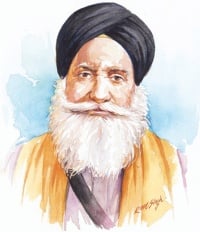
Baba Kharak Singh’s long public life began innocuously enough – when he was elected Chairman of the Reception Committee of the fifth session of the All-India Sikh Conference held in his home town, Sialkot, in 1912.
The Jallianwala Bagh massacre in 1919 and the subsequent events in Punjab under Martial Law galvanized him into political activity. He addressed the annual session of the Indian National Congress which was held as Amritsar in December 1919, under the presidentship of Motilal Nehru (Jawaharlal’s father).
Baba Kharak Singh was elected the first President of the Shiromani Gurdwara Prabhandak Committee (SGPC) in 1921. In November that year, the Punjab Government passed an order whereby the keys of the toshakhana (treasury) of the Golden Temple at Amritsar were to remain in the custody of the Deputy Commissioner of the district.
The SGPC protested and an agitation was launched. Baba Kharak Singh was arrested. The agitation continued.

On January 17, 1922, the keys of the Golden Temple were handed back to Baba Kharak Singh, who had been released along with thousands of other political prisoners, at the Akal Takht. On this day, Mahatma Gandhi, who was then ‘Dictator’ of the Indian National Congress, sent the following telegram to Baba Kharak Singh:
“First decisive battle for India’s freedom won. Congratulations.”
In a lecture at Lahore he said “In the fight for India’s freedom if you find a bullet in my back, do not count me as one amongst the Sikhs of the Gurus and do not cremate my dead body according to the Sikh rites. A disciple of the Great Gurus is an ideal saint-soldier and it supposed to fight in the vanguard and face the bullets in the chest and not in the back, and we the Sikhs shall never allow any foreigner to rule over Motherland, and we shall brook no injustice.”
He organized a mammoth demonstration in 1928 when the Simon Commission visited Lahore. He was again sent to jail in 1931 but was released after six months. He was re-arrested in 1932 and detained for 19 months in prison. Once again he was taken in custody in 1935 for his scathing criticism of the Communal Award.
He was again sent to the jail in 1940 for participating in Satyagrah movement in 1940. In spite of his old age, Babaji did not stop his activities. He was one of those leaders who unhesitatingly took up the cause of the I.N.A. in 1945. During the elections of 1946 he toured the whole of the Punjab and the N.W.F.P. and made a magnificent contribution to the success of the Congress.
According to Jawahar Lal Nehru, during his whole life had never surrender to what he considered to be wrong or evil, whatever the consequences might have been.
At another place Mr. Nehru said about him, “There are few hands which can uphold the honour and preserve the dignity of the national Flag better than those of Babaji”.

“Pandit Nehru was in Parliament when he heard that Baba Kharak Singh had passed away. He rushed from Parliament to be by his bedside.
“When he arrived there he saw that Baba ji was still struggling. Nehru was angry at having to rush out on the midst of a Parliament session and he asked the doctors for an explanation. ‘Well, technically he is dead. But this is some kind of a struggle going on within him,’ said the doctors. There he was, struggling till the very last”, recalls Gurdit Singh Jolly.

Refrences:
- Sikh Achievers by Ranjit Singh (Hemkunt Publications)
- Sikh Wikepedia

